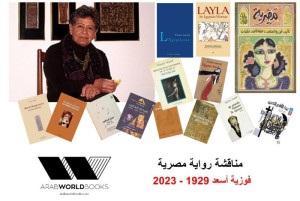Source:Alshorfa.com
November 24, 2010 By Nohad Topalian in Beirut
Author Lina Kreidieh, one of the owners of Dar Al-Nahdah Publishing House, recently published a novel, "Khan Zada". She tells stories about women in their 50s who are struggling in their daily lives. Kreidieh also provides a snapshot of Beirut and its traditions.
Al-Shorfa met with her to discuss her latest work and her memories of Beirut while growing up.
Al-Shorfa: Why is your first novel called "Khan Zada"?
Kreidieh: It is my father's aunt's name. She is the pillar of the novel because her face represents what is good while the faces of other characters shatter mirrors. These characters become faces that meet the beautiful and kind face of Khan Zada, including her brother who deviated from the family rituals and drifted to liquor and women.
Al-Shorfa: Why did you choose to write about Beirut in your first book?
Kreidieh: Because I am a daughter of Beirut. I talked about it through the novel. I addressed subjects that concern Beirut, such as its failure to produce creative authors. Beirut produced just one female poet, Suzanne Aleiwan, and I am the first one to write a novel. Only a few have addressed life in Beirut within a novel and with an intimate human face, not as a researcher.
Al-Shorfa: People who read the novel believe you addressed everything that relates to the core of Beirut.
Kreidieh: No one can outdo me (when it comes to love for Beirut). I am the daughter of this environment where I have lived all my life. Our home is across from al-Farouk Mosque.
Al-Shorfa: Is it true that some parts of the book were unpopular with Beirut residents?
Kreidieh: Some did not like what I wrote about avarice. It is characteristic of people in the cities. I talked about things related to Beirut such as the dish "Mufataka" and Job's Wednesday. I incorporated these details into the novel because they are part of the life in the city.
Al-Shorfa: The customs and traditions of Beirut occupied a large section of the book.
Kreidieh: Because no one has written about it yet. No one knows that people in Beirut put a fez on the coffin to indicate that the deceased is male and not female or that the Turkish sarma, a square piece of cloth embroidered with gold thread, is placed on the coffin to indicate that the deceased is the son of a respectable family.
I recall childhood details such as when I used to walk behind lollipop vendors, 'naoomeh', 'Kalawi ya fool' and getting food poisoning.
Al-Shorfa: Is the novel only about Beirut?
Kreidieh: It is not just about Beirut. It is about depressed women in their 50s. There is weakness and grief within, as well as the fall of ideologies and dreams. I take a cross-section of people whose faith in Beirut has diminished, and as a result they return to sectarianism and factionalism.
I talk about women who were able to establish their presence; women who have learned and made decisions and reached a position where they paid a price for their excellence. Women who did not make concessions but paid the price for their dreams, their freedom and devotion to their work, and as a result they suffered loneliness and isolation, despite having a family and a career.
Al-Shorfa: Will you write another book?
Kreidieh: I am preparing a new book. In "Khan Zada" I wrote about the concerns of educated women and masculinity. In my new book I talk about different perspectives, areas very far from Beirut.
Al-Shorfa: What about the poetry contest you launched at Al-Nahda?
Kreidieh: It is an initiative rather than a competition. It is true that our publishing house has an economic component, but we have a stance on the Arabic language and a point of view on literature and poetry. Both constitute an essential pillar in the language. When we launched the poetry project five years ago, we participated in all the book fairs in the Arab world and we displayed their books. The Maghreb poet is now being read in the Gulf and the entire Arab world. This year, we want to encourage anyone who wants to publish a poetry collection for the first time.
Al-Shorfa: You are preparing for the first Arab Forum for Electronic Journalism in Egypt. Why?
Kreidieh: Because we are looking ahead. When we talk about electronic journalism, we will not abandon the newspaper. Time is moving towards progress and electronic publishing at the expense of print. We organised this forum with the Arab Organisation for Administrative Development in the Arab League and Akhbar al-Yom newspaper. The conference will shed light on this reality, and explain the vision for our future in the Arab world, as well as our position on what is happening abroad.
Lina Kreidieh: 'Khan Zada' captures slice of life in Beirut
By: Editor - on: Wednesday 25 October 2017 - Genre: Interviews
Upcoming Events

Joseph Conrad's Heart of Darkness Discussion
April 27, 2024
Join us for a special discussion of Joseph Conrad&...

A writer, a vision, a journey: a conversation with Francis Boyle
February 24, 2024
This event took place on 24 February 2024 Yo...

Discussion of Fawzia Assaad’s An Egyptian Woman
November 25, 2023
In celebration of the life and outstanding achieve...

Toni Morrison's The Bluest Eye, A Presentation and Discussion
October 28, 2023
This presentation and discussion of Toni Morrison&...
